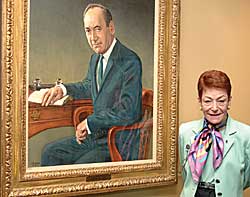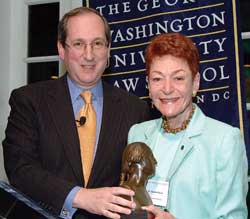|


|

Dr. Rosalie Burns
stands in front of the self-portrait of
her father, Jacob Burns, LLB ’24,
Hon. LLD ’70. In addition to his
highly successful law career, Jacob Burns
was an accomplished portrait and still
life painter.
|
Jacob Burns Family Endows Faculty Chair
for Legal Clinics With $2 Million Gift
It’s impossible to walk the halls of GW
Law without witnessing the remarkable legacy
of the late Jacob Burns, LLB ’24, Hon.
LLD ’70. One of the Law School’s
foremost benefactors, Jacob Burns’ name
graces GW’s law library, moot court room,
Community Legal Clinics, largest merit scholarship
fund, and the list goes on.
This spring, the Jacob Burns Foundation began
a new chapter in its ongoing relationship with
the Law School, endowing a faculty chair for
the Jacob Burns Community Legal Clinics. The
generous gift places GW Law among a select group
of law schools in the nation to display its commitment
to clinical education by establishing an endowed
clinical chair. Coinciding with the 15th anniversary
of the dedication of the Jacob Burns Community
Legal Clinics at GW, the gift underscores the
Burns family’s steadfast support of the
University’s renowned clinical program.
“We are extremely proud of the Burns family’s
association with the clinical law program at
GW, which is ranked among the top in the nation,” says
Dr. Rosalie Burns, daughter of Jacob Burns and
executive vice president of the Burns Foundation. “My
dad was a very grateful and loyal alumnus of
GW Law School and the legal clinics were particularly
dear to his heart. We’re pleased to help
the clinics continue to advance and prosper.”
GW’s Legal Clinics, founded in 1971, provide
members of the community with critically needed
legal services while giving motivated law students
the opportunity to experience the practical application
of law and to develop skills as negotiators,
advocates, and litigators. “The clinics
serve more than 2,000 low income and elderly
D.C. residents each year who wouldn’t otherwise
have access to legal representation, while providing
some 200 GW Law students with invaluable hands-on
legal experience,” says Burns, an active
member of the Law School’s Board of Advisors. “Through
the endowed clinical chair, we’ll help
ensure that the clinics will continue to have
strong leadership and provide important services
to the Washington community.”

Dean Frederick M. Lawrence presents Dr. Rosalie Burns with a bust of
George Washington at a spring dinner of the GW Law School advisory
boards.
|

|
According to GW Law School Dean Frederick M.
Lawrence, the endowed clinical chair is a perfect
complement to the Burns family’s long list
of philanthropic endeavors at the Law School. “The
Burns family has been an enormous benefactor,
not just in terms of sheer amount of philanthropy,
but in terms of the breadth and depth associated
with its generosity,” says Lawrence, who
worked with the family to establish the chair. “The
Burns name was previously associated with every
aspect of the Law School except faculty endowment,
so this latest gift enhances the portfolio of
their philanthropy. The endowed chair is the
highest attainment in the academy, and the Burns
endowment allows us to signal to the legal academic
world that the clinical component of our faculty
is strong and will remain strongly supported
by the Law School in perpetuity.”
Lawrence says one of the early highlights of
his tenure at GW Law has been working with generous,
dedicated supporters like the Burns family. “Both
Dr. Rosalie Burns and Barry A. Shenkman [president
of the Burns Foundation and the grandson of Jacob
Burns] understood the mission and asked all the
right questions about the endowed chair,” Lawrence
says. “I am pleased and touched that three
generations of the Burns family have remained
so strongly connected to our Law School and so
supportive of our efforts.”
Since its inception in 1959, the Burns Foundation,
a not-for-profit organization located in Pleasantville,
N.Y., has contributed funds in support of the
arts, legal education, legal ethics, and Jewish
philanthropic causes.
“Jacob Burns was a very caring and principled
person who wanted to give back to the community,
and we take a great deal of pride in carrying
on his name and philanthropy,” says Dr.
Rosalie Burns, who chaired the Department of
Neurology at the Medical College of Pennsylvania
for 20 years.

|

At the 1967 building dedication of
the Jacob Burns Law Library, GW President
Lloyd Elliott, Judge Sterry R. Waterman
of the U.S. Court of Appeals for the
2nd Circuit, Chief Justice of the United
States Earl Warren, Jacob Burns, and
Law School Dean Robert Kramer chat
in front of the plaque marking the
occasion. |
Professionally, Jacob Burns was a renowned lawyer
and corporate executive. He grew up in Washington,
supporting himself from a young age after losing
his parents as a teenager. Burns graduated with
distinction from GW Law in 1924, attending night
classes while working full time as shipping clerk
in a small local factory to finance his studies. “My
dad was grateful for what GW did for him,” Burns
says. “He felt that GW Law offered him
his future.”
After practicing law for a few years in D.C.,
Burns moved to New York to launch a business
venture with his two brothers that ultimately
became the U.S. Vitamin and Pharmaceutical
Corp. He served for many years on the board
of directors of the corporation and was later
elected chairman of the board, a position
he held until the company merged with Revlon
in 1966. Burns simultaneously maintained
an active Manhattan legal practice specializing
in corporate, estate, and trust law, and
was active in many professional organizations,
including the New York County Lawyers Association
and the New York State Bar Association.
Throughout his successful career, Burns remained
passionately involved with his alma mater, serving
as a long-time trustee and leading philanthropist.
GW conferred upon him the honorary degree of
Doctor of Laws in 1970 and awarded him the Distinguished
Alumni Achievement Award in 1983. Burns also
served on the board of directors of the GW Law
Alumni Association and received the Association’s
Distinguished Alumnus Award in 1975.
An accomplished portrait and still life painter,
Burns studied under Gerald L. Brockhurst, the
distinguished English portrait painter. Burns’ portraits
of prominent New York judges have been on exhibit
at Columbia University Law School, Brooklyn Law
School, and the New York County Lawyer’s
Association, and his self-portrait hangs at the
Jacob Burns Law Library at GW.
Lawrence says that the self-portrait is a constant
reminder of Jacob Burns’ generosity and
lasting legacy to the Law School. “When
I walk out of the Law School every night, I pass
the self-portrait of Jacob Burns and it’s
a very special feeling for me to know that his
hands were on that canvas, just as his hands
are on everything that we do here at the Law
School,” Lawrence says. “Even years
after his passing, he still plays a major role
in so much of our success.”
—Jamie L. Freedman

Class of 2006 Gift
Remarkably, more than 67 percent donated
nearly $23,000 to the Second Annual
Graduating Class Gift. This year’s
contributions benefited the Scholarship
Fund and the Loan Reimbursement Assistance
Program.
The class donations were matched four
to one because they surpassed the Class
of 2005’s participation of 52 percent.
The total gift with the matching funds
will exceed $100,000. Thanks are due
to Student Bar Association President
Eric Koester, JD ’06, Amir Shaikh,
JD ’06, and the Class Gift Committee,
whose outstanding efforts led to this
unprecedented result.
Additionally, special thanks go to Professors
Gregory Maggs, Joan Schaffner, Steven
Schooner, Daniel Solove, Peter Smith,
and Jonathan Turley for their participation
and donations. |

The George Washington
University Law School Intellectual Property
Advisory Board
CO-CHAIRMEN
Roger L. May, JD ’72
Raymond P. Niro, JD ’69
MEMBERS OF
THE BOARD
Brian Brunsvold, JD ’67
Hon. Q. Todd Dickinson
Richard L. Donaldson, LLM ’73
Charles R. Donohoe, JD ’70
Donald R. Dunner
Hon. Timothy Ellis
Albert E. Fey, JD ’58
Jack C. Goldstein, JD ’68
A. Sidney Katz, JD ’66
|
|
Edward J. Kessler, JD ’70
Gary S. Kindness, JD ’65
Jeffrey P. Kushan, JD ’92
Luiz Leonardos
Hon. Richard Linn
Don W. Martens, JD ’63
Norman F. Oblon, JD ’68
Hon. Ralph Oman
C. Larry O’Rourke, JD ’71
Daniel R. Passeri, JD ’94
Hon. Marybeth Peters, JD ’71
Louis T. Pirkey, JD ’64
Hon. Randall R. Rader, JD ’78
G. Franklin Rothwell, JD ’56
Harold C. Wegner
Hon. Ronald M. Whyte
|
|

Gift Supports Returning Students
A recent gift to the Law School will support
students who are returning to school in their
thirties or later.
After working for many years as an economist
with the Labor Department, Robert J. Rosenthal
returned to school to earn a JD at GW Law in
1957. He then went on to have a successful career
with the National Labor Relations Board in Washington
from 1957 until he retired in 1978.
A native of Troy, N.Y., he and his wife of 59
years, Elaine P. Rosenthal, BA ’60, have
both passed away, but their charitable remainder
trust gift to GW Law in excess of $700,000 will
assist people in similar situations who want
to return to school later in life.
Rosenthal graduated Phi Beta Kappa from the University
of North Carolina in 1937 and received a master’s degree from American University in 1947.
His wife was a Phi Beta Kappa art history major at GW who earned her degree
while working full time at the Department of Interior.
The Elaine P. Rosenthal and the Robert J. Rosenthal
fund will be used to pay full time or part
tuition for students 30 years or older who
are beginning law school or who are resuming
attending law school to complete their JD
or post-graduate degrees.

The George Washington
University Law School Board of Advisors
CHAIRMAN
Richard
W. Blackburn, JD ’67
CHAIRMEN EMERITI
David
R. Berz, JD ’73, BA ’70
Donald E. Egan, JD ’62
MEMBERS OF THE BOARD
Hon.
William P. Barr, JD ’77
Bradley Ian Berger, JD ’72
The Hon. Edward Blackmon Jr.,
JD ’73
David S. Brown Jr., JD ’69
Carol Elder Bruce, JD ’74,
BA ’71
Bobby R. Burchfield, JD ’79
Rosalie Burns, M.D.
Steven L. Cantor, JD ’75
Dale L. Carlisle, JD ’60
Douglas E. Davidson, JD ’71
Stephen J. Davidson, JD ’73
Darrell L. Dreher, JD ’73
Jared M. Drescher, JD ’67
David B. Falk, JD ’75
Hon. Steven M. Goldman, JD ’76
|
|
Gary
C. Granoff, JD ’73,
BBA ’69
Franklin L. Haney, LLB ’65
Hon.
James F. Humphreys, JD ’78
Jonathan S. Kahan, JD ’73,
BA ’70
J. Richard Knop, JD ’69
Theodore A. Levine, JD ’69
Edward H. Lyman, JD ’68
Robert E. Mangels, JD ’70
Alexia Morrison, JD ’72
Preston R. Padden, JD ’73
Robert L. Patron, JD ’98
Edwin L. Phelps, JD ’68
The Hon. Margaret M. Richardson,
JD ’68
Marcos G. Ronquillo, JD ’79
Hon. Gerald Rosen, JD ’79
John T. Schwieters, JD ’65
William H. Shawn, JD ’73,
BA ’70
Ronald J. Silverman, JD ’72
Thomas F. Smegal Jr., JD ’61
Ira L. Sorkin, JD ’68
Dennis Charles Sweet III, JD ’80
Steven A. Tasher, JD ’73
James L. Volling, JD ’79
Charles S. Walsh, JD ’67
Timothy J. Waters, JD ’68
Martha Brown Wyrsch, JD ’86
|
|
|